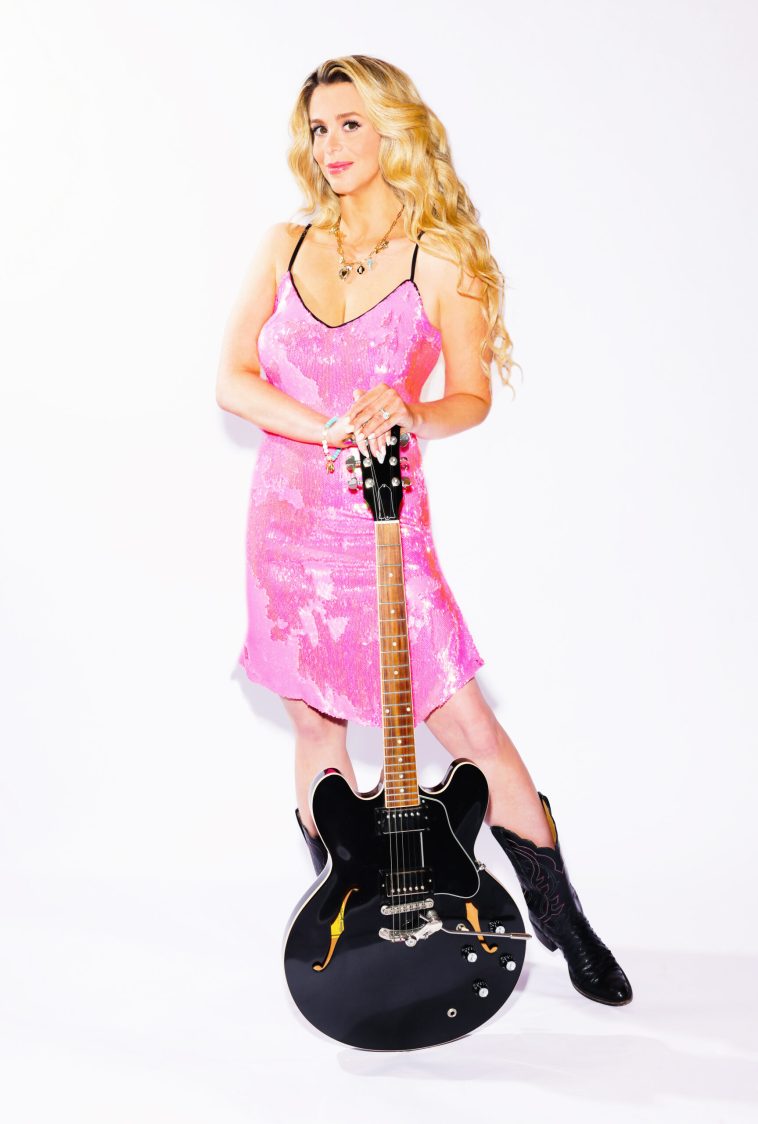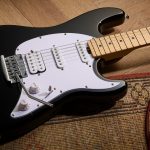Ana Cristina Cash has built a career rooted in authenticity, resilience, and a deep passion for storytelling. With her latest release, “Last Call” (English) / “Tu Última Llamada” (Spanish), she delivers an anthem of self-respect and empowerment, channeling raw emotion through her powerful vocals and a driving country beat. The song speaks to anyone who has faced betrayal and chosen to reclaim their power, embodying Ana’s signature fusion of Country and Pop with a Latin influence that makes her sound truly unique. Whether singing in English or Spanish, she effortlessly bridges cultures, crafting music that resonates across audiences.
A seasoned artist with an impressive career spanning decades, Ana first captured hearts as a child performer on Sábado Gigante before signing with Sony Music’s Latin division as a teenager. She made history in 2005 as the first Hispanic American to sing the national anthem at a presidential inauguration, a moment that underscored her ability to command the stage.
Now, with a deepened connection to her country roots and a continued commitment to her craft, Ana has embraced her most authentic self. In this interview, she opens up about her songwriting process, her favorite guitars, and the inspirations behind her music, giving us an inside look at her journey as an artist.
“Last Call” is a powerful anthem of resilience and self-respect. What inspired you to write this song, and how does it reflect your own experiences or emotions?
I showed up at Willie Breeding’s studio in East Nashville for a writing session with both him and our mutual friend, Jodi Marr, with no expectations. I knew I wanted something strong with a powerful beat that contained minor chords. We were humming to a chord progression, and Willie started building the track as we went along. I always carry a notebook around with me that is full of song titles. Song titles are incredibly important to me. I had “Last Call” listed as a song title, and we went along with that. Jodi, myself, and Willie used not only a lot of bar room references in the song but a lot of references regarding the idea of it being a last phone call that someone makes from jail, or when they are in deep trouble. Ultimately, “Last Call” is a song about putting up boundaries with the person who has wronged you to protect your heart. It is letting them know that you will not always be around if the bad behavior continues. It is a song about empowerment.
You recorded the song in both English and Spanish. How do the two versions differ in terms of emotion or storytelling?
I felt that writing the Spanish version of “Last Call,” called “Tu Ultima Llamada,” would be very appropriate. I am Cuban-American and have been completely fluent in Spanish my entire life. I knew that this song could have a broader reach than just the English-speaking audience, and that “Tu Ultima Llamada” would have the power to bring my Country-Pop sound from Nashville to Latin America and that we could effectively bridge the two genres together. People have messaged me online and told me that “Tu Ultima Llamada” just sounds so incredibly passionate and commanding. I wanted to bring that passion to the Country music world.
The track blends Country and Pop influences while staying true to your Latin roots. How do you approach fusing these genres in your music?
There is a fine line that comes along with blending both genres without being corny concerning the translations or running the risk of losing the audience in each genre. Each version has to be authentic. It takes a lot of careful consideration and hard work. When I sat down with both of my producers for the project, John Carter Cash and Willie Breeding, we all knew that each rendition had to be respected and treated as its own song. Also, before I sat down to even write or sing anything, I told myself and them that I wanted a joyful-sounding project with beats, rhythm, and instrumentation that is usually utilized in Country music recordings such as banjo, fiddle, and pedal steel. The vision that I had for the fusion of Country music and Latin music that was created on my project not only came to fruition by doing Spanish versions of the Country-Pop songs, but also by tastefully blending Country, Pop, and Latin instrumentation where it felt right.
What message do you hope listeners take away from this song?
With “Last Call” I want the listener to know that it is okay to choose yourself first for the sake of your own mental health and peace of mind. In relationships, we can sometimes overcompensate and accept treatment that is not in line with the way that we should be treated or spoken to, simply because we fear that we will end up alone. There comes a point where one must say “enough” and shed the version of themselves that only accepted mere crumbs from someone. We can always learn, grow, and be reborn into a version of ourselves that vibrates at a higher level.
You’ve been performing since childhood, starting with Sábado Gigante and later signing with Sony Music as a teenager. How has your artistic evolution shaped the artist you are today?
Starting to work in the music industry at a very early age shaped who I am today, defined many of the artistic choices that I make, and gave me a lot of discipline. Because I started off working in the Latin music industry, being that I was geographically located in my hometown of Miami, the gateway city to Latin America, I listened to tropical rhythms, Latin Pop, dance, reggaeton, and many other Latin genres growing up. When I moved to Los Angeles between 2010 and 2014, I soaked up the culture of arthouse cinema, performed in various singer-songwriter venues such as The Sunset Marquis, The Hotel Café, House of Blues, and the Roxy, and had many friends across various artistic disciplines. I became friends with fashion designers, other musicians, actors, photographers, and filmmakers. I call that my “bohemian period,” and I was endlessly inspired to write songs and to create. I moved to Nashville and married my husband, John Carter Cash, and I have been working in the Country world for a decade out of our recording studio, The Cash Cabin Studio. I have been deeply immersed in the Country music world for over a decade, working with both bluegrass and country musicians. I look back through the various incarnations of my life, and I can hardly believe it. It has been a wild ride. My artistic evolution is now all bundled up into this current record and what has been created.
Growing up bilingual and bicultural, how has your Cuban heritage influenced your songwriting and sound?
Cubans have a great sense of rhythm and improvisation! Salsa is similar to jazz in the sense that improvisation is encouraged. Because of this, I have never recorded a vocal the same way twice. Even if a vocal take is slightly different and barely noticeable, it is still always different. I also gravitate toward joyful sounds. I not only have Cuban heritage, but ancestry from Spain as well, and I draw from the drama and passion of all of that in my current music. I now bring nuances of these things into Country music.
You made history as the first Hispanic American to sing the national anthem at a presidential inauguration. What did that moment mean to you personally and professionally?
It was an incredible moment to be able to stand at the President’s actual podium and deliver America’s anthem. As a person whose family fled an oppressive Communist regime in Cuba where there were no basic human freedoms, to sing a song about liberty and my family’s adopted Country was very emotional. I also felt so humbled and honored when I was invited to sing for Hispanic Heritage Month in the East Room of the White House during the following year.
Since marrying John Carter Cash, you’ve embraced an even deeper connection to Country music. How has working with him influenced your songwriting and production approach?
Through my time in Nashville and working with him, I have probably earned the equivalent of a Master’s in Country Music. I was immediately immersed in the songs and world of the first family of Country music, The Carter Family, and Johnny Cash among other things. His mother, June Carter, was the daughter of Mother Maybelle Carter of The Carter Family. My first job moving to Nashville with him was doing “Cash on Cash” shows for tourist groups in The Country Music Hall Of Fame. We have also had so many Country artists in the Cash Cabin studio that I have either worked with or observed. I particularly received a lot of life advice from Loretta Lynn, who I worked with before she passed. She advised me a lot early on while living in Nashville. She, in many ways, was like my Nashville grandmother. How many people get to say that? I feel so blessed to have had the experiences I have had. Country music is a magical genre, and I am so lucky to be a part of it. I have been blessed to not only know Loretta but also legends such as Reba, Kris Kristofferson, Willie Nelson, Jon Anderson, The Oak Ridge Boys, and more.
Can you take us behind the scenes of your creative process? Do you have any specific routines or inspirations when writing music?
Yes. I get ideas for songwriting at random times of the day. It could be while I am driving, showering, etc. Therefore, it is so important for me to have my phone on hand to record voice memos. I can think of melodies and lyrics without holding an instrument or start either writing on the piano or guitar, and it will just come to me. It helps to have time in the day that I can allocate to just being creative and getting my work done.
What is your go-to guitar for songwriting and performing? Do you have a favorite model or brand that feels like home to you?
My Martin 000-14 Fret Venetian Cutaway that was custom made just for me!!
Looking ahead, what’s next for you? Are there any upcoming projects, collaborations, or tour plans in the works?
I would love to continue to write with collaborators and also by myself and see where the next project will take me. I will not know until I sit down to work on the next thing. My work is not pre-meditated; it has to be inspired. I would also love to write some kind of a book project.





GIPHY App Key not set. Please check settings